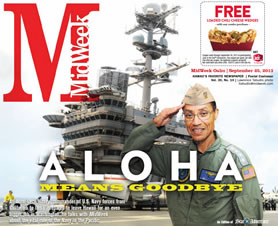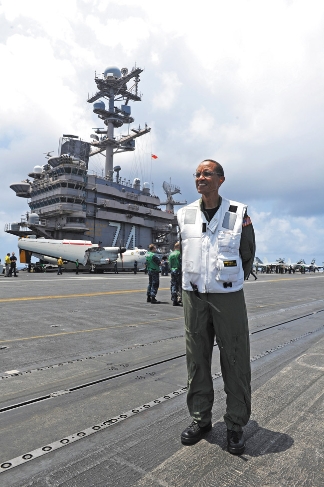Aloha Means Goodbye
As the man who commands U.S. Navy forces from California to India prepares to leave Hawaii for an even bigger job in Nebraska, he talks with MidWeek about the Navy’s vital role in the Pacific
It seem like we barely got to know you.
Adm. Cecil Haney, Commander, U.S. Pacific Fleet, is getting ready to depart the Islands. His change of commander ceremony is Oct. 16 and, like many military members, his actual time in state has been just a portion of the calendar days it covered.
mw-cover-042013-haney-1
Since taking over the job Jan. 20, 2012, Haney rarely has stopped moving, speeding among Asia, Alaska, Hawaii and Washington, D.C. It’s been a blur of activity one would either enjoy or go crazy in the process.
One such example of his never-plan-too-far-ahead mantra came not long ago on a trip from the northern border of his command. Haney was midway on a return flight from Alaska when a message was received calling him to D.C. – not a week later, but as soon as possible. He landed in Hawaii, went home, packed a small travel bag and was back in the air within a few hours.
Those who work with him most closely, his staff, describe their boss as a “thoughtful warrior” based on his intellectual approach to problem solving, his commitment to a strong defense and the Navy’s effect on the national economy.
According to the commander, more than $5.3 trillion of commerce flows through South China Sea alone, of which one-fifth is related to the U.S. That’s pretty important stuff.
“The lifeblood of our economy, our way of life, depends on the sea,” says Haney. “Maritime security is important to the free flow of that commerce, and the decades of security at sea has allowed that commerce to happen.”
Haney knew from early on he would pursue a military career. His father was an Army veteran, and continuing the tradition just seemed natural. Which service to explore his career options at the time was still to be determined. Haney admits to being interested primarily in a branch of the military other than the Navy. He won’t say which, but a chance encounter with a Navy captain while the then-young Haney was working at the Washington Navy Yard changed his direction. Whoever that captain was, and Haney doesn’t recall, the man in charge of every sailor and every piece of naval equipment from California to India would like to say thanks. His advice to apply to the Naval Academy worked out better than either man could have hoped.
“When I looked and saw that at the Naval Academy I could be a Marine if I wanted to, a pilot, a submariner if I wanted, a SEAL … as I got exposed to that, it just looked like a vast opportunity that I could get my education and serve in something special.”
Haney moved up through the ranks, serving on both submarines and surface vessels, and, he says, learning leadership skills from just about everyone he met. Much of that experience was tested as he moved into the senior ranks and was forced to deal with one of the most shocking scandals in the history of the U.S. military: the sexual assault of service members by their uniformed colleagues.
In May, the Pentagon released a study that an estimated 26,000 people in the armed forces were sexually assaulted in 2012. This was an increase from 19,000 in 2010. The results were based on a confidential survey that was sent to some 108,000 active duty military members.
These stats, says Haney, are troubling and inexcusable. “I am personally troubled every time I read reports alleging our sailors of these heinous acts. That is why this past November I directed all of my commands to conduct a stand down to stamp out sexual assault. Those who commit these crimes will be held accountable while we provide maximum support to victims.”
How to reverse this terrible trend is a tough question to answer. Various commands have begun working with area bars and restaurants to report to military officials when service members are recognized as being drunk or under the influence of drugs. Haney says understanding why service members commit sexual crimes and training are key elements in preventing further crimes. In April, the Navy underwent a campaign to inform members of the problem and to encourage them to report any crime they witness or are told about.
This isn’t just a legal and moral issue, says Haney, these assaults threaten the operational effectiveness of the Navy.
“Sexual assault is a crime that is incompatible with our Navy core values,” he says. “It also negatively impacts our most important mission of war-fighting readiness. Our readiness is predicated on the working relationships forged among sailors and with our partners around the world. One instance of poor personal judgment in the workplace or on liberty can put these crucial relationships and readiness at risk.”
Haney was nominated by President Barack Obama in June to lead the U.S. Strategic Command. He was confirmed by Congress in August and shortly will take over the job that, according to its website, requires Haney to oversee the U.S. legacy nuclear command and control mission; space operations; global strike; Defense Department information operations; global missile defense; and global command, control, communications, computers, intelligence, surveillance and reconnaissance, and combating weapons of mass destruction.
All quite stressful, no doubt, but probably less so than dealing with his Washington-based civilian supervisors.
Haney is being replaced by Adm. Harry B. Harris Jr., a 35-year Navy veteran whose last assignment was as assistant to the chairman of the Joint Chiefs of Staff. But regardless of who follows, Haney says Hawaii’s role in maintaining the nation’s military and economic interests will not change. “For the last 70 years, Hawaii has played a critical role as the Navy’s Pacific Fleet headquarters. From the maintenance support our units get at the Pearl Harbor Naval Shipyard to the warm feeling of aloha our sailors receive from people across the state, the Navy has enjoyed a long and storied history here. Hawaii is not just a place for our various Navy facilities. It is our home, and we are proud to be part of this special community – the Hawaii Ohana.
“Hawaii also is the doorstep to the vital Indo-Asia-Pacific region, which is critical to our strategic interests including the American economy. These enduring interests will not change, nor will our commitment to the security of our Pacific allies and support to partner nations. The United States is and will remain a Pacific power, and that effort begins here in Hawaii.”







